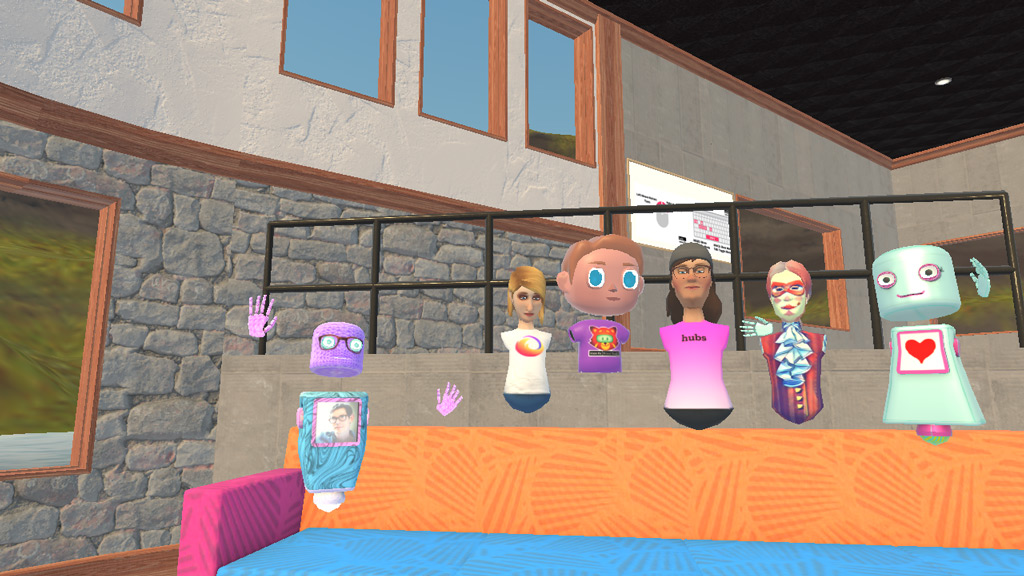Mozilla Hubs Cloud is the foundation of the free metaverse
Virtual events and meetings are the topic of the moment. As a consultant, I am receiving many requests for remote collaboration tools now during the lockdown, and with my partners Massimiliano Ariani and SIDI, I am also hosting some workshops in VR. For this reason, I gained a good expertise in immersive collaboration tools, and one of the VR platforms that I love the most in this sense is Mozilla Hubs.
Today, Mozilla has announced a new service related to it called Hubs Cloud, and I think that it can be an important stepping stone for a future decentralized metaverse.
What is Mozilla Hubs?

Mozilla Hubs is an immersive meeting tool that lets you meet online with other people, and speak with them. Inside the space, you can import various objects, and interact with them with your companions. Described like this, it sounds similar to a bazillion of other immersive meeting tools.
But it is not a tool like the others: as you can read from this Medium post by Greg Fodor, Hubs has an ambitious masterplan, with the goal of becoming the metaverse of the future. And given its potentialities, I think that this goal is absolutely possible.
In fact, Hubs has some amazing special features that make it pretty unique:
- It works completely in your browser, and this means that it doesn’t require you to install an app to use it;
- Since it is fully in WebXR, it is compatible with all devices. Really, it works with all platforms: PC, Mac, smartphones, PC VR headsets, Oculus Quest, even Cardboards! This means that it is completely inclusive;
- To join a meeting on Hubs, you have just to share a link with the other people, and they join the meeting by just clicking on that link. This removes all the friction of other apps, and follows the same pattern that has made Zoom so successful;
- It lets you create easily your rooms in the metaverse by using an online editor called Spoke, that is fully visual. Everyone can create his online meeting spaces;
- It lets you customize your avatars;
- It lets you import in your virtual world whatever you want: Youtube videos, web pages, 3D models from Sketchfab, etc… If it is online, you can import it in Hubs.
Hubs may be a bit rough around the edges, but its power is its easiness of use and the full freedom it gives you. Furthermore, it is opensource, so you can modify what you don’t like of it.
Mozilla believes that this is the recipe that made the web successful and that can make its metaverse successful as well: something messy, decentralized, that let everyone create and share his own personal space easily. 30 years ago they were web pages, nowadays, it is web rooms.
But Hubs has a problem to fulfill its vision: it is still too centralized on Mozilla servers…
Meet Hubs Cloud
Hubs Cloud is the first step that Mozilla is taking to transform Hubs in a complete decentralized system. Mozilla is giving you the whole infrastructure running Hubs as an AWS image that you can deploy on your AWS network. This means that you can host on AWS your own Hubs instance, with your own custom avatars, with your own custom worlds, with your own rooms. Not just your room, but your custom Hubs infrastructure.
On Amazon Marketplace, you can find two instances: one is Hubs Personal, that gives you a single server for personal use, and the other one is Hubs Enterprise, giving you a full architecture that you can use for more professional purposes.
This is massive because until now hosting your version of Hubs meant having big knowledge of server management, and this prevented Hubs from becoming a distributed system like WordPress. Yes, there have been some interesting forks like UXR by Enea Le Fons or Mespper in Brazil, but they were exceptional cases. With Hubs Cloud, many more people will be able to host their own Hubs instance, completely white label, on their own cloud. This is just a first step and it is already very powerful.

Soon Mozilla is going to host a complete guide on how to create and manage your Hubs instance in AWS so that to enable the biggest number possible of people to install it. For now, you can refer to the official Quick Start Guide.
And remember that it is fully opensource: you can modify parts of Hubs so that to have your personal customized metaverse, with the functionalities that you need. For instance, UXR was made with embedded end-to-end cryptography to fully guarantee your privacy in the metaverse.
How many people there could be in a Hubs Cloud instance?
Today I attended an online private event inside Mozilla Hubs where Mozilla revealed to us some features of Hubs Cloud, and clarified some of our doubts. It was a cool moment, and I have to thank Lars Bergstrom, Liv Ericksen, Elgin, Kent Bye and Charlie Fink for the good time spent together.
Liv Ericksen explained to us that depending on the Amazon Virtual Machine you’re going to buy, you can have a certain number of people together. For instance, with a t2 micro machine, you can have up to 12 people together in Hubs. Notice that it is not the number of Hubs rooms that you must handle that determines the machine that you have to buy, but it is mostly the number of concurrent users on your Hubs world that will require you to buy more RAM and CPU for your Amazon virtual server.
With larger machines you can arrive up to 30 people per room, a hard limit that Mozilla has set because beyond it, usually, there are always problems, either on the server side (e.g. too many computations requested to the server) or on the client side (e.g. the user has an Oculus Quest, that can’t manage all those people that must be rendered in the space).
The company is investigating how to increase that number, for instance, dividing the people in different roles (spectators vs participants) with different bandwith requirements (spectators don’t need to stream voice, so they could be more); or providing optimizations, like rendering and making you hear only the people that are close to you.
When you reach 30 people in a single room, the system blocks the others, but even here, Mozilla is investigating how to make the system grow organically, creating a new clone room for newcomers when the original one has reached the maximum capacity.
What about Azure and private servers?

Currently Hubs Cloud works only with AWS. Not because there is an exclusivity contract, but because they decided to start from only one service, the one that they knew better.
There is no ETA for a similar feature for Microsoft Azure, not even for a one-click-install (like for WordPress) on your own self-hosted server. Liv Ericksen explained to me that they are evaluating these scenarios, and for the self-hosted server they are also thinking about some preset configurations. You may install Hubs on a private server because a company wants to keep control of all its data, but different entities (education, military, etc..) have different requirements, and Mozilla is studied how to offer them all.
IMHO, only with simple installations on all servers, Hubs can really become the WordPress of the Web 3.0, because that way, anyone could easily create its own private world, completely personal and separated from the others. Like now I have my WordPress, on my server on which I have my own personal space (that I hope you like :D).
Scripting is coming, but not too soon
Another thing much needed in Hubs is the possibility of creating your custom actions. The system is fully opensource, but again, this is something only for web architects, and prevents all other people from creating their own alive worlds. Spoke is a nice editor, but with it you can only create a world, even with animated objects, but with no embedded logic.
Having the possibility of scripting some logic into the world would be great to finish the process of allowing full customization. This may be also important for business. I have already been contacted by people thinking about doing some special events or e-commerces in Hubs, and with simple actions associated with the shopping items (e.g. that trigger a Paypal payment), it would be easy to create new kind of business worlds in Hubs. Not to mention the fact that once the community will be empowered with creation tools, it will be able to create with Hubs things that Mozilla has not even thought about.

Mozilla has stated that it has in mind to allow that, and the two possible roads are:
- Provide some APIs, so that developers can script the behavior of the elements in the scene, most probably using Javascript;
- Implement some action blocks in Spoke, so that you can have some kind of logic visual editor with blocks that connect the action associated with an object to its effect (e.g. click on the duck -> the duck explodes). This is probably the one that creators would love the most.
I hope for both: number 1 would make developers happy, number 2 would make creatives happy.
Why not a Unity exporter?

I tried the WebXR exporter for Unity, and I love it, so I asked why aren’t they making a Unity exporter for Hubs worlds. I mean, I could craft my whole world in Unity, export it into WebXR, and then Hubs could use it.
Mozilla has answered me that it is a feature that many in the community want, but it is not coming soon because Unity WebGL build process is undergoing huge changes, and so such an exporter can be implemented only when the situation will become more stable.
In the end, I think that Hubs Cloud is an important step towards the creation of a free and decentralized web metaverse. There is still a long road to go, and this road passes through the empowerment of everyone (not only the most technically skilled ones), to host his/her own metaverse easily, and customize it completely as he/she wants in an immediate way. There is still the need for increasing the scalability of the system because 30 people per room are too few. Graphics are too rough and should be improved a lot. And there are many other fixes here and there that are necessary.
But it is the right road, and I hope it will pay off because Mozilla Hubs is the metaverse of the freedom. Good luck Mozilla!
Disclaimer: this blog contains advertisement and affiliate links to sustain itself. If you click on an affiliate link, I'll be very happy because I'll earn a small commission on your purchase. You can find my boring full disclosure here.



